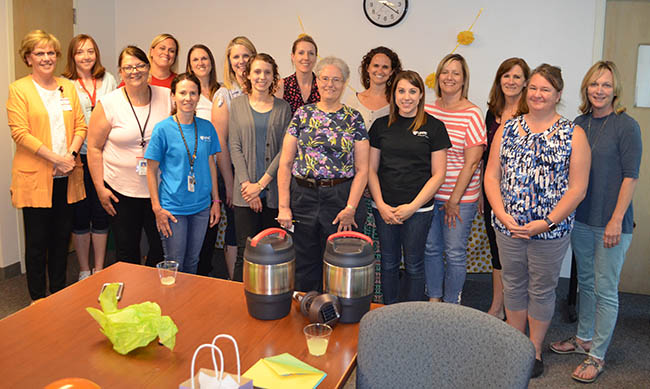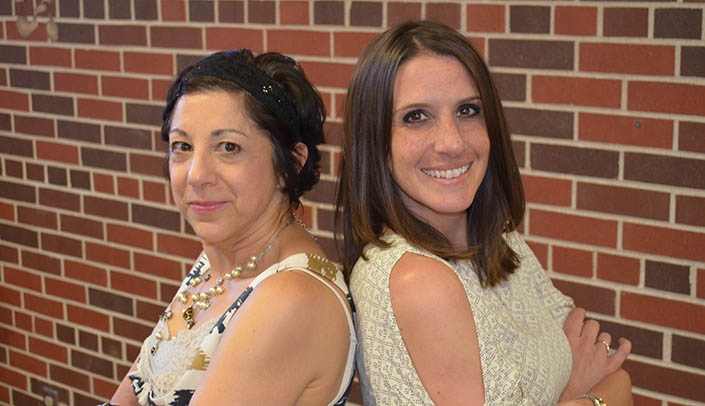Article co-authored by Drs. Piazza, Peterson, among most downloaded
An article co-written by MMI’s Cathleen Piazza, Ph.D., and Kathryn Peterson, Ph.D., “A comparison of a modified sequential oral sensory approach to an applied behavior-analytic approach in the treatment of food selectivity in children with autism spectrum disorder,” published in Journal of Applied Behavior Analysis, was one of the journal’s top 20 most downloaded recent papers, according to the publisher.
As of year-end, the article had received 3,726 downloads. This means:
- Amongst articles published between 2016-2017, the article was one of the most frequently downloaded in the 12 months after online publication
- The article generated immediate impact and helped to raise the visibility of Journal of Applied Behavior Analysis.
 |
Members of the MMI Department of Occupational Therapy pose at the retirement celebration for Judy Carroll, center. |
Colleagues gather to celebrate Judy Carroll’s retirement
Occupational therapist Judy Carroll, who will be retiring this summer after nearly 34 years of service in the MMI Department of Occupational Therapy, was honored by her colleagues at a May retirement event.
“During her tenure in OT, Judy has worn many hats,” said Janice Flegle, director of the department. “She had a passion for finding creative solutions to the challenges faced by the students at J.P. Lord school that will be missed by many — and we in the OT department will miss her enthusiasm and commitment.”
ABA Ph.D. student receives 2018 Bijou grant
Ciobha McKeown, a student in the Applied Behavior Analysis Ph.D. program who works in the virtual care program under the advisement of Kevin Luczynski, Ph.D., has been selected by the Society for the Advancement of Behavior Analysis (SABA) Board of Directors as the recipient of a 2018 Bijou Grant in the amount of $10,000 for her dissertation topic on teaching friendship skills.
The Sidney W. and Janet R. Bijou Grant provides funding for two doctoral students per year in departments of psychology, education, or related areas that can support research in behavioral development. Recipients of this highly competitive award are recognized each year at the Association for Behavior Analysis International (ABAI) annual convention.
Shorts
- Kathryn Menousek, Ph.D., assistant professor in the MMI Psychology Department, was the recipient of the Silver U for June.
- Brandy Clarke, Ph.D., assistant professor of psychology at MMI, was elected secretary/treasurer of the UNMC Faculty Senate.
- The Human Genetic Laboratory’s oncology test menu was updated to include additional probes of interest within the Eosinophilia and Non-Hodgkin Lymphoma FISH Panels.
- Evan Roberts, Molecular Genetic Technologist II, and “The Batcape” (his mustache) raised money for Special Olympics through M4K Omaha.

A deeper understanding of Autism Spectrum Disorder (ASD) is critical in today's clinical and cultural environment, particularly with children. A wide range of behaviors that were previously classified in broad and sometimes pejorative categories (e.g. inattentive, troublemaker, 'retarded', learning impaired, problem child, etc.) are now beginning to be understood in a more differentiated and nuanced light, thanks to the extraordinary efforts of researchers like Drs. Piazza and Peterson. These advancements in the understanding of ASD are all the more timely and significant given the current national debate over the future of public schools, federal financing and special programs; (increased understanding of ASD as it relates to juvenile behavior may also contribute significantly to the ongoing discussion of prison reform, particularly the purely punitive approach vs. more reform based measures). The achievements of these and other researchers should also raise awareness of the continued need to foster scientific research rather than making it a partisan political cudgel to further divide the country.
As our understanding of ASD expands, we will eventually find new treatment modalities that will give ASD children a chance to reach their fullest individual potential; we may even find that some high functioning ASD children have unique and irreplaceable insights that contribute to the betterment of humanity in ways we cannot presently foresee.
For these and many other reasons, ASD researchers like Drs. Piazza and Peterson should be both applauded for their work and given the funding, encouragement and latitude build on their already significant achievements.